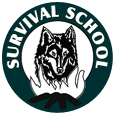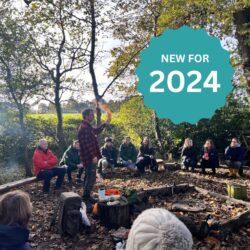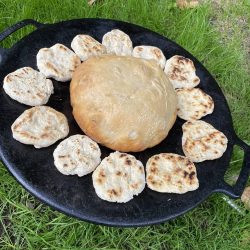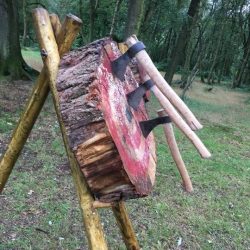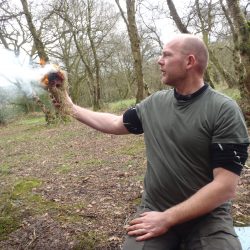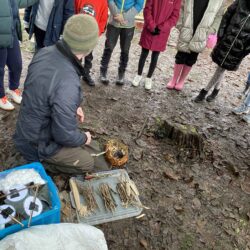Description
Course outline:
The Survival School Level 3 NCFE CQ Qualification in Fieldcraft, Animal Observation and Tracking is designed to enable those wishing to locate and get up close to animals in their natural habitat. The purposes of this course is to gain a skill set that can be used for multiple applications including: photography. observation, population control or military not forgetting, industry that uses Fieldcraft as an essential skill set. We deliver this course through hands on learning about behaviours, habitats, habits, territories and how to use traditional and modern techniques and equipment to get closer to your target species.
We will be using a variety of Night Vision equipment. Infrared, Thermal, Different quality of viewing devices, lamps and filters.
First, let’s define~:
Fieldcraft: A combination of skills and techniques needed to live, travel or make scientific/ military observations, leading to the prediction/ anticipation of the movements of a target species and of how to intercept that species in the field.
Tracking: An ability to read/ apply a sequence of techniques to identify and follow a species through its print, spoor, debris, smell, sound or identifying mark it’s left during its journey.
By developing these skills and more you can get closer to your chosen species, understand behaviour and acknowledge dangers and the Law that surround the topic.
Successful completion of the course, you will gain “Survival School Level 3 Certificate in Fieldcraft, Animal Observation and Tracking”.
Becoming a “Professional Tracker, Trained Hunter” or similar takes time, experience and patience this weekend will start that journey.
Modules include:
- Sit spots: Become aware of the art of Fieldcraft and Animal Observation. Place yourself in a location and become part of the environment.
- Fieldcraft, Land and the Law: Trespass, land permissions, hunting, firearms discussion and legal calibres. A discussion regarding land permission, dangers and factual near misses.
- Fieldcraft, Origin and History: We look at where we have come from and where we are in the evolution of Fieldcraft, Animal Observation and Tracking techniques and equipment.
- Tracking Sign Awareness: Footprints, broken branches, debris are all sign instrumental in the art of tracking. Can we create a time-line that we can estimate when, where the crest issued and is heading and can we intercept it?
- Camouflage – Concealment and Overcoming Animal Defence Mechanisms. Terrain/ environment/ habitat: where does our target species live? What are the creatures needs? How can we Overcome the defence mechanisms of the animals around us? Do you know the 7 S’s of camouflage and concealment; Shape, Shine, Sound, Stealth, Signature, Silhouette, Shadow and how to use them to best effect?
- Hides: Learn how to identify the correct location, build a hide and spend the night in your hide. Identify how and what you need to occupy and stay undetected for the night.
- Animal Observation and tracking at Night: We can’t see in the night or can we? We take a look at night manoeuvres using the latest Infrared, Thermal imaging and mobile light sources and filters to observe how our animals are behaving during the hours of darkness.
- Practical and Applied Fieldcraft: On Sunday morning we will practice manoeuvres in stalking, Camouflage and Concealment and interception of target species. This will hone the skills you have developed and bring skills to life.
Learning Outcomes
Information and Kit list
Suitable outdoor clothing (see below)
Sleeping bag
Insulated sleeping mat
Knife, fork, spoon, mug, bowl and plate
Water bottle (1-litre mineral water bottle will do)
Head torch with fresh batteries & 1 spare set
Wash kit & towel
Pair of gardening gloves
Whistle
Personal toiletries & medication (to include toilet paper, sunscreen, insect repellent and lip salve)
Antibacterial wipes/soap
Tea or Coffee + whitener
Small first aid kit (plasters, bandages, headache pills etc.)
Spare change of clothing
Camera + Notebook + pen (optional)
Hammock, Tarp or Tent
Cooking Stove
Billy Can, Stove your preferred cooking equipment.
Outdoor clothing
Please, if possible bring with you camouflage clothing, drop into your local army surplus or similar. Or come in outdoor clothing that’s tough and comfortable. Wearing several thin layers is better than a few thick layers. A waterproof jacket and several sweatshirts underneath are sufficient. Jeans should not be worn, as they are slow to dry, clinging and cold. Natural colours or camouflage will give you a better chance of spotting wildlife. Walking boots are ideal, but wellies in wet weather and trainers in dry weather will suffice.
Please pack your torch, antibacterial wipes/soap and insect repellent at the top of your bag.
Food
This weekend is self-catering, will also need to bring food for the weekend (2 x breakfast, 1 x lunch and 2 x evening meals). You can cook over the campfire, or you can bring your stove. Hot water is provided as the kettle will be over the fire all through the course.
This Survival School Accredited Level 3 CQ is not part of the Level 4 foundational syllabus and is a stand-alone course developed for personal and professional development and is delivered regionally not at every Survival School site or venue.
